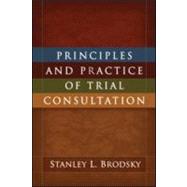A pragmatic guide to a growing area of professional practice, this book describes the multiple roles of the trial consultant and provides tools for carrying them out competently and ethically. Leading authority Stanley Brodsky uses examples from actual trials and depositions to illustrate how knowledge and skills from psychology and related fields are applied in the legal context. He shows how to use scientific methods and findings to assist with jury selection, help attorneys focus their arguments, prepare witnesses for the rigors of cross-examination, and conduct change of venue evaluations. The examples are drawn from a wide range of civil and criminal cases. In addition to behavioral scientists, legal professionals also will find important insights and strategies in this book.








